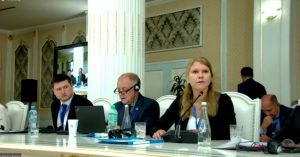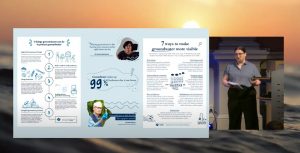Cross-cutting issueEngaging youth is key to good water governance
There have never been so many young people in the world, and they must have a say in decisions about water that impact them. Youth empowerment is a pillar of SIWI’s work and a cross-cutting issue that is reflected in all of our projects and programmes.
 Silhouettes of young people against a sunset. Image by Vintage Tone.
Silhouettes of young people against a sunset. Image by Vintage Tone. Fundamentally, we all have a right to influence our own destiny and take part in decisions that affect us. This right is well recognized, but when it comes to youth participation, it is far from well implemented and stronger efforts are needed to fulfil it.
Many countries around the world have young populations who are still being left out of decision-making processes that impact their lives. We often talk about youth as being the future, but they are also here right now, with important insights and experiences. For water governance to be effective, these perspectives must be present at the decision-making table.
Youth empowerment is one of SIWI’s cross-cutting issues and a guiding principle for all our work. There is a growing global movement of young water advocates who make invaluable contributions as activists, researchers, innovators, and entrepreneurs, for example, but who often do not get the respect and attention they deserve. SIWI tries to change this by tirelessly calling for more youth participation in international processes and by constantly reminding decision-makers about the benefits of including young people in decision-making.
SIWI staff are given training on how to ensure that young people’s voices and perspectives are included in our projects and programmes. This can involve ensuring that young people are invited to delegations, consultations, and decision processes; it can mean providing capacity-building and mentorships; and it is an obligation to always review and monitor projects based on the consequences for young people.
An important part of SIWI’s work is to provide opportunities for young people to be heard. This inclusion is built into projects and activities, and reflected in decisions about who we collaborate with. We also prioritize topics and activities that focus on young people, for example strengthening access to water and sanitation in schools. When implementing a project, project managers use a checklist to make sure that they follow best practice for youth inclusion.
While capacity-building among youth is a strong first step, it must be part of a longer process. Activities claiming to empower youth cannot be a one-way passage of information to youth but rather a diplomatic and empowering two-way flow of perspectives and information. The inclusion of youth must be part of an investment throughout the entire process. If, for example, young voices are invited to deliver a statement at a high-level meeting, they should also be part of the decision–making process regarding the content of the meeting and in reflections around the outcome.
SIWI aims to be a leader in youth empowerment. Here are some examples of our work:
- The working paper Making Waves: Youth engagement in water diplomacy made the case for Youth Engagement in Water Diplomacy. The paper’s conclusions are widely applicable to many processes.
- The Shared Water’s Partnership has contributed to an annual water diplomacy training for selected young environmental leaders and started partnerships with several youth organizations.
- As the organizer of World Water Week, the leading event on global water issues, SIWI can offer an important stage for young people. World Water Week is a co-created conference, with many organizations hosting sessions, but all session organizers are encouraged to follow the Gold Standard, so that at least one panelist is under the age of 35. The Gold Standard was introduced in 2017, and the following year, 80 per cent of sessions complied with it. SIWI has also designed World Water Week to be a useful conference for young attendees, who make up a third of participants, with activities catering especially to students and young professionals. Young here is defined as someone under the age of 35.
- The Stockholm Junior Water Prize is a competition for innovators aged 15-20 in close to 40 countries. The aim is to encourage young people to develop solutions to local and global water challenges. The programme contributes directly to addressing water-related problems that young people face and also provides opportunities for innovation and entrepreneurship. The top finalists participate in capacity-building workshops and receive coaching from experts.








